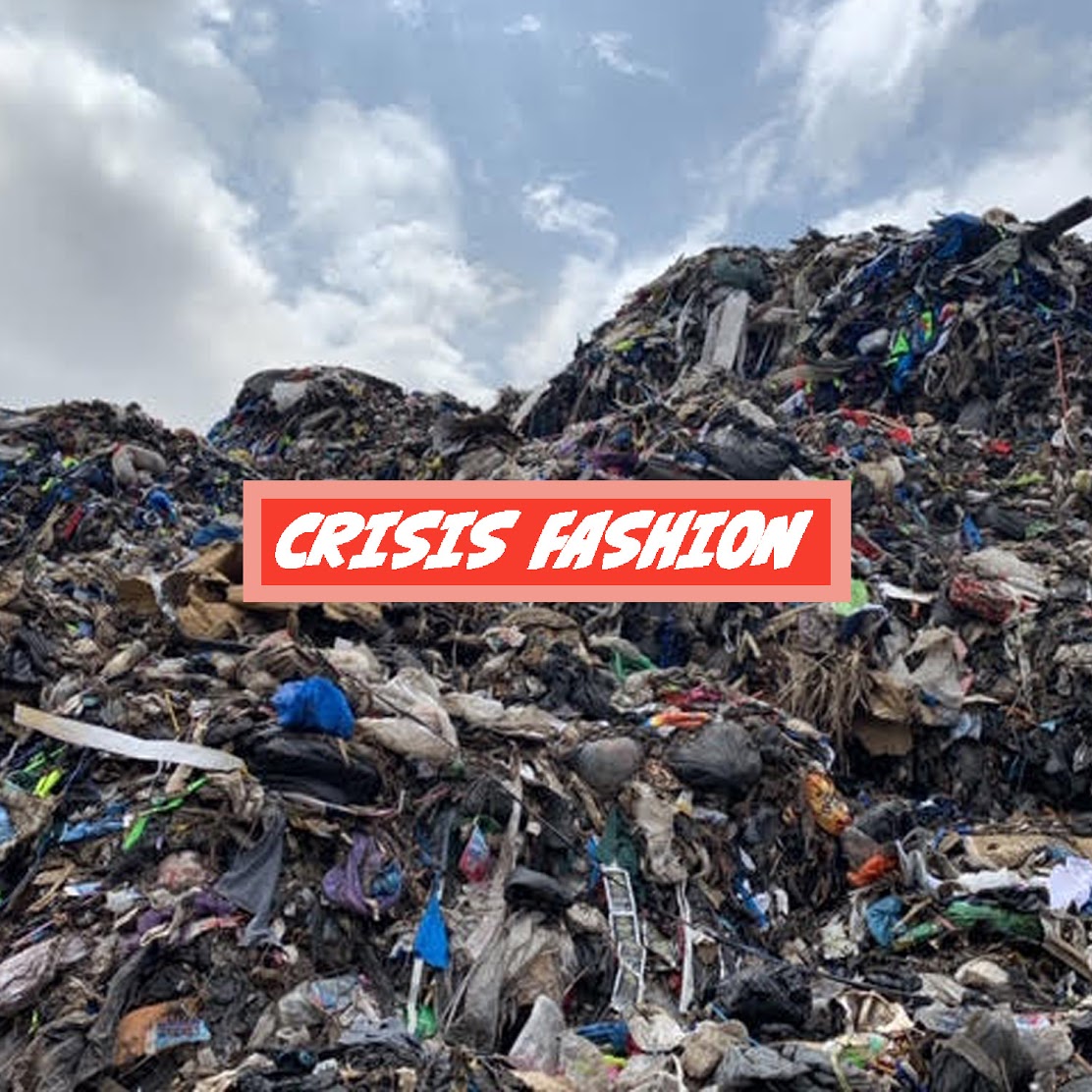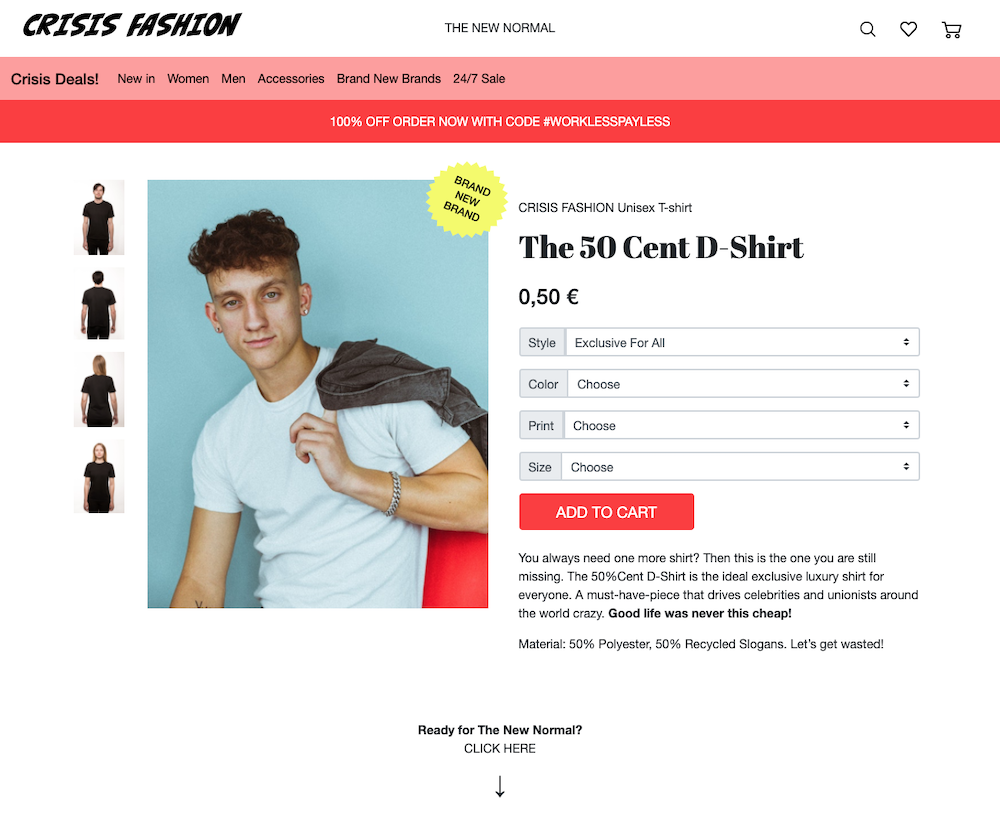Fashion Revolution Week: Crisis Fashion & five ways to take action
ho
Check the imaginary fashion brand and webshop that calls on fashion companies to take responsibility and take action yourself.

2020 marks the 7th anniversary of Fashion Revolution Week (20-26th April). The yearly event stems from the terrible factory collapse of Rana Plaza in 2013 and aims to raise awareness of the effects the fashion industry has on our planet and calls on companies to take more responsibility for factory workers.
In support of this week’s event, Fashion Revolution Germany has launched Crisis Fashion, a satire campaign with an imaginary fashion brand and fictive webshop that aims to shake up the industry and consumers. Officially launched on Wednesday, April 22, the website is accompanied by an online campaign with memes and slogans such as “Social Distance Fashion – When you don’t know who made your clothes” and “Our Prices are in Crisis”.

Mocking the marketing methods of fast fashion brands, Crisis Fashion draws attention to the situation of seamstresses in hard-hit production countries. In the fictive webshop crisis.future.fashion one can supposedly buy a white T-shirt for only 50 cents. As soon as you interact with it, however, the shop disintegrates and reveals the actual message of the campaign: information about the current situation of factory workers and a series of options for sustainable action to the fight against inhumane conditions.
In the wake of the Corona Pandemic, the relevance of a Fashion Revolution is undeniably revealed and more urgent than ever. While in Germany there are discussions about relaxing lockdown measures, many fashion brands have shirked any responsibility and cancelled orders worth several billions of dollars.
As a direct result, countless factory workers are now confronted with unemployment and loss of livelihoods and those countries without the security of social welfare or stable health systems remain the weakest links in the value chain and are deprived of their needs and rights. The resulting poverty could be more deadly than Covid-19 disease itself. No money and no health system mean corona may result in an even greater disaster than Rana Plaza. Clean Clothes Campaign is collecting here daily information on how the new virus is influencing the rights of fashion workers in supply chains around the world.

Every crisis not only brings challenges but also extraordinary opportunities for change, so Fashion Revolution Germany is calling for a new start in the fashion industry. Many pioneers and visionaries in the industry have already shown over the last 10 years that transparent, fair and environmentally friendly fashion is becoming The New Normal.
“In the wake of the current pandemic, the industry must commit to building back better being mindful of social, economic and environmental impact. Crisis Fashion presented by Fashion Revolution Germany takes a traditional shopper experience and embeds powerful advocacy to highlight the supply chain crisis and how we are failing our fellow humans. Crisis Fashion highlights how to bridge the gap with concrete strategies for action.“
– Kerry Bannigan, Conscious Fashion Campaign x United Nations Office for Partnerships

The Crisis Fashion brand is looking back at an impactful first week: a few thousand shoppers so far visited the shop and—instead of buying a 50 cent T-shirt—have chosen to Take Action by sending an email to a fashion brand calling for responsibility and action or supporting textile workers by donating to an emergency relief fund.
Five ways to become active
Fashion Revolution shares five proposals that you can put into practice to demonstrate to companies of the sector that making the transition to fully ethical and sustainable practices is the way to build the future of fashion.
1. Ask the labels #WhoMadeMyClothes? & #WhatIsInMyClothes
Share a selfie or photo on your social networks and ask the brands behind your clothes #WhoMadeMyClothes & #WhatsInMyClothes? With this you give a voice to people who have been robbed of their own and ask the labels to question the influence of the materials they use on our planet.
2. Send emails to brands with dubious practices
Inform yourself about brands’ practices and make them take responsibility for their workers in this difficult time. You can find a suitable e-mail template here.
3. Share your personal love-story with #LovedClothesLast
Clothes that are loved live longer. Under #LovedClothesLast you can share this love between you and your heart with us on our social networks. No matter if you wear your favourite jeans or the costume grandma already wore, we are looking forward to your stories.
4. Take part in virtual events
You can find a detailed list of the different events here.
5. Check out this fanzine
Action required: 10 global Goals goals that will change fashion still available here and deals with the fashion industry’s relationship to 10 of the UN ́s sustainable development goals.